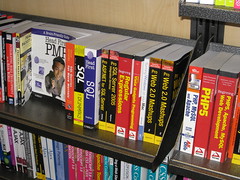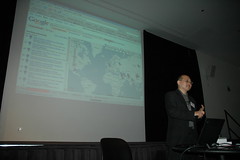One of the fun parts of writing my book was writing the marketing blurb on the back cover of the book.  I often find myself reaching to copy and paste it into emails or other documents when I describe my book. Here it is:
Pro Web 2.0 Mashups: Remixing Data and Web Services
Dear Reader,
The Web contains thousands of mashups that recombine everything including Google Maps, Flickr, Amazon.com, NASA, the New York Times, and Wikipedia with useful information about travel, finance, real estate, and more. By fusing elements from multiple web sites, mashups are often informative, useful, fun, and even transformative. Mashups also represent the way the Web as a whole
is heading.
By reading this book and working through the examples, you will learn how to create your own mashups; how to exploit such web elements as URLs, tags, and RSS feeds in your mashups; and how to combine APIs and data into mashups. All you need to make full use of this book is basic knowledge of HTML, CSS, and JavaScript, and at least one server-side language (such as PHP, ASP.NET, or Python). By the time you’re finished, you will be able to take almost any source of data on the Web and mash it up with another to create unique and exciting sites of your own.
This book draws from my experiences teaching graduate students and high school students how to create mashups. I describe techniques to analyze and dissect existing mashups so that you can start from first principles, gaining the skills you need to write your own. Believe me, once you start creating mashups and seeing what you can do with them, you won’t want to stop.
Does it make you want to run out to buy a copy of my book? Let's hope it does!
Tagged blurb cover

